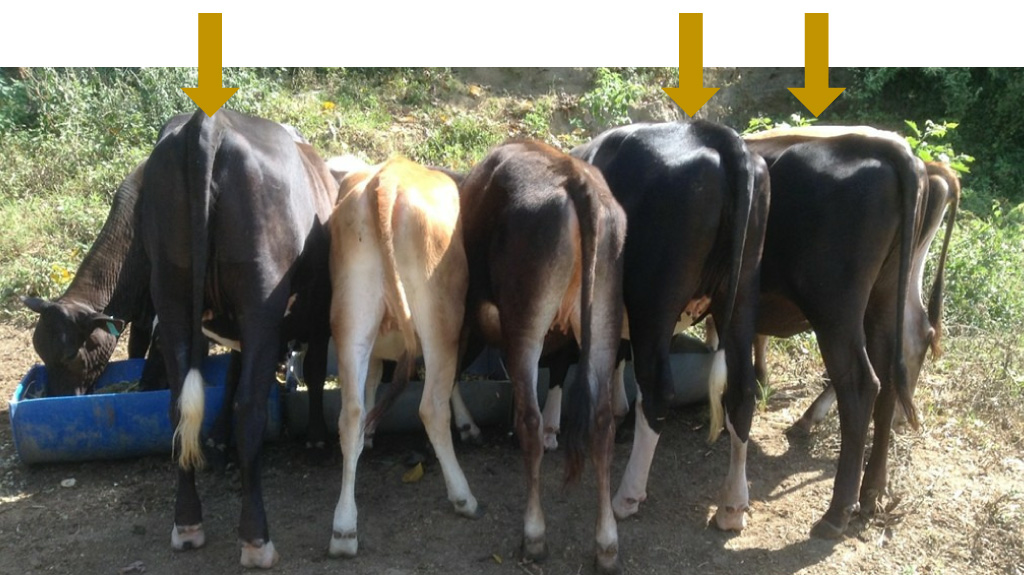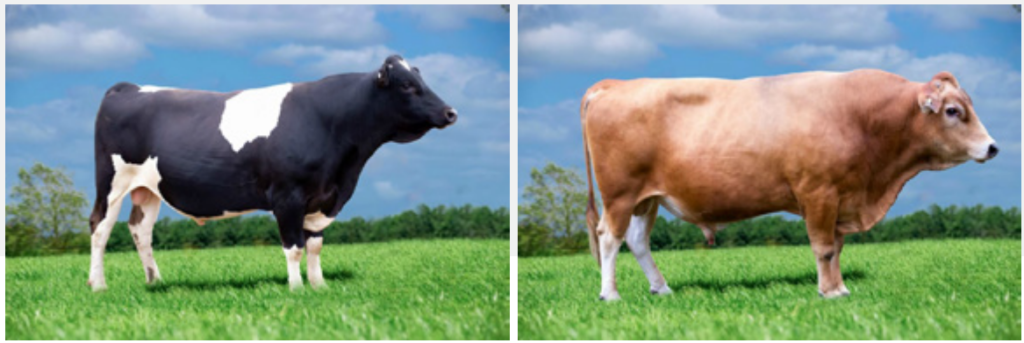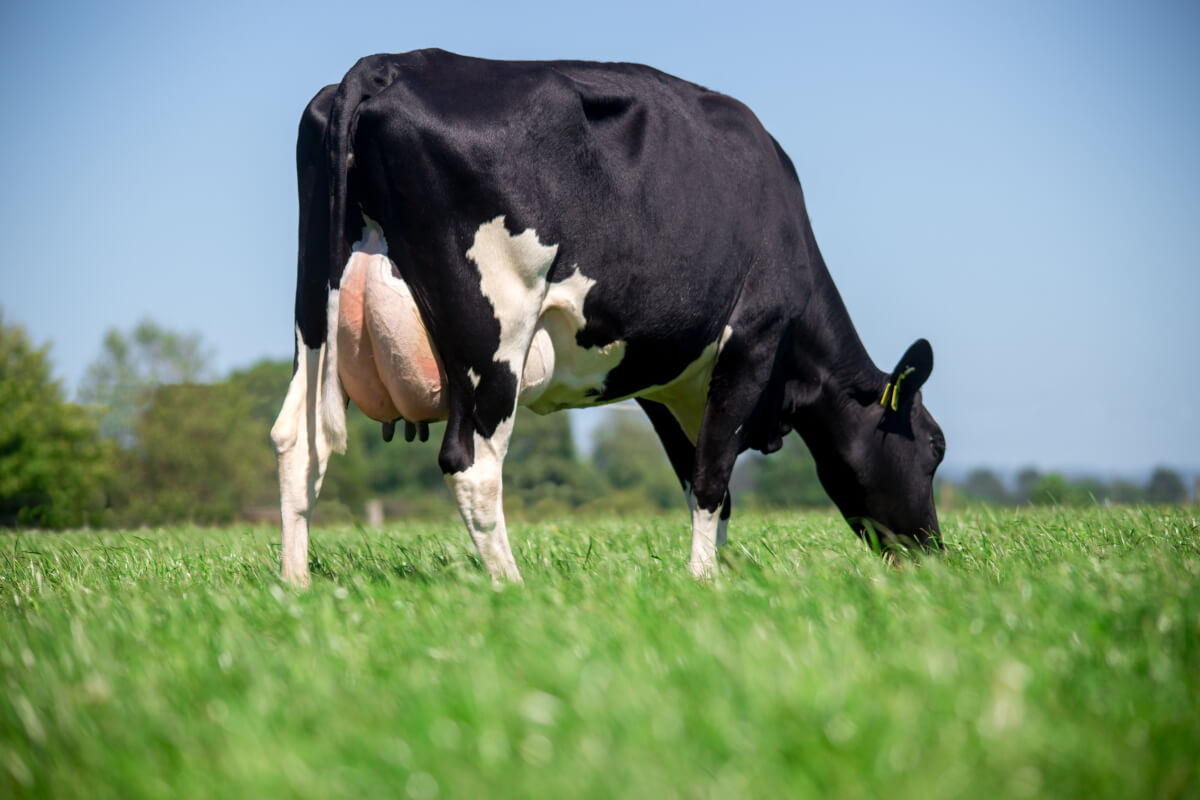“SLICK” IS GREEN! SLASH METHANE OUTPUT PER KG MILK OR MEAT
How does the SLICK gene contributes to Climate Change Mitigation?
The heat tolerance enables the cattle to continue to eat and grow or milk well under higher temperature and humidity. In tropical environments the utilization of energy and nutrient intake must first meet maintenance requirements, which are also increased under heat stress (estimated +15%).
In the central Philippines young heifers with the SLICK gene grew on average 50% faster than their equivalent non-slick herdmates, hence reaching puberty and calving several months earlier. It is a major saving in feed cost and reduction in methane, plus farmer income is brought forward.
GET SLICK TO REDUCE YOUR COSTS OF PRODUCTION AND TO GROW YOUR HERD!!
The benefits of higher feed intake are reflected in 20- 30% higher milk volume (e.g. +3-4 litres per day), and cows maintain condition to breed back earlier. Feed cost (and methane produced) can be halved, or more, per litre of milk over the lifetime of the cow. With more regular calvings you will get more replacement heifers to grow your herd and improve quality. Even if feed quality is sub-optimal for extended periods in the year, and the cattle may struggle to eat sufficient to grow or milk well, SLICK animals will eat more aggressively, and can then also take better advantage of an improved diet non-SLICK herdmates.

PHILIPPINES SUCCESS STORY
The NZ Philippines Dairy Project funded the first introduction of sexed semen from dairy sires carrying the SLICK gene in 2016. The semen was distributed to dairy farmers by the National Dairy Authority, (NDA). Based on the success of the first importations (1,000 sexed straws from two homozygous Kiwipole bulls—Eros and Himeros), NDA has since continued to regularly import and promote uptake of sexed semen from homozygous SLICK gene sires. One of the early adopters of the SLICK genetics was the Santa Maria Dairy Farm, at Batangas operated by Mr Jose Tapay. A sister company promotes various dairy feeds and supplements so the heifers and cows at Santa Maria do benefit from a well managed feeding program. However, the performance of the SLICK calves stood out from an early stage, growing at double the rate of non-slick herdmates during the hotter period (April average 34 degrees). Later in the year when it was 31-32 degrees, both groups were growing better but the SLICK calves still grew 40% faster. Less dramatic differences were achieved on another farm nearby, but the SLICK calves still consistently showed +30% growth. Hence in current models for improved breeds dairy heifers or beef cattle we are calculating an average 50% advantage in growth in climates over 30 degrees average temperature. The heifers reach puberty several months earlier and hence calve earlier too. In typical systems this reduction in maintenance can equate to a US$500 saving in feed required to reach first calving. Over the average lifetime feed savings can be halved per litre of milk. The efficiencies continued when the SLICK heifers were milking with similar outcomes to results in Florida and Ecuador, producing an extra 3-4 litres per day of lactation. In 2021 the Santa Maria herd was recognised as the top producing herd in the Philippines, in the NDA Gawad awards. NDA has recently followed up with another order of 3,000 straws of sexed semen from Homozygous SLICK gene sires. A boost to viability of dairy herds.
SLICK WEANED HEIFERS w HERDMATES

Homozygous SLICK Beef sires available!
ABOUT US HISTORY
Around this time Livestock Improvement Inc. the dairy farmer owned cooperative in New Zealand identified that there was a single gene that was conferring Heat Tolerance (and a mutation that increased heat sensitivity). This gene became known as the “SLICK” gene, due to the short haircoat of animals carrying the gene, but less obvious is the increased density of sweat pores in the skin, and some degree of tick resistance. So these animals are proven to be more RESILIENT under Tropical conditions.
Hamilton, New Zealand, only experiences heat stress conditions for a few months in Summer, so the performance testing occurs in true tropical zones. New Zealand has an excellent health status and service options for production and export of semen and embryos to most markets, and to protect the genetic nucleus. Genetics are also sourced from top breeders in the USA and Australia. TrRG has the most comprehensive team of SLICK sires across the breeds; Holstein, Jersey and Kiwipole Crossbred


Dr David Hayman
MANAGING DIRECTOR BVSC, MBA
With a broad experience in Breeding Program management, Embryo Transfer and livestock Export Projects, Dave will build the high quality genetics pipeline, the TrRG team, and provide valid advice to customers.
M Ph. +64 274 965 983
Email: Dave.Hayman@trgenetics.co.nz
Shubhendra Singh
SALES AND ADMINISTRATION
Shubhendra has a degree in International Business and experience in Livestock management and admin for large scale export programs. He will manage orders and product despatch with expert assistance from the team at Animal Breeding Services, our primary repro-technology service provider, which operates approved and regularly audited semen and embryo production centres.
Office Ph: +64 7 843 7577
Email: office@trgenetics.co.nz

ABOUT BREEDING PROGRAM
The Tropical Resilience dairy SLICK Breeding program has a broad base including some of the top performing herds in New Zealand e.g. HSS, Waipiri and Kaipaki Dairy, plus embryos and animals selected from the most progressive SLICK program in the USA (Fit Dairy Genetics). We are now working to incorporate an Australian breeding pool. The program uses Genomic DNA analysis plus local and international production indexes to drive selection for the most profitable animals, but also taking into account welfare traits like the polled gene. Profit is driven by:
- Early and regular calving for longevity and herd growth
- High milk value relative to body weight (can be with higher milk solids)
- Robust cattle able to process large amounts of roughage feed
- Easy care with Resistance to disease—mastitis, lameness
In each new market we can adapt our Profit Index for local factors, but usually it selects a medium size, easy care and fertile productive cow.
The beef genetics that carry the SLICK gene have been developed in partnership with Rissington Farms, a long established breed leader in Simmental, Angus and the innovative hybrid Profitmaker cattle. Rissington P101(front page) is the ultimate Profitmaker with easy calving, but superb growth and maternal indexes, i.e. similar principles as the dairy selection program. We will diversify the breed base as customers require.
The selection and sire development is guided by Dr Hayman with input from well respected breeders such as; Henk Smit, Dave Fullerton, Dr Jeffrey Bewley (US), and the Rissington principals; Daniel and Jeremy Absolom.

Tropical Zone Focus
Tropical Resilience Genetics is fully focused on making impact in the true tropical and semi-tropical zones where the SLICK gene adds major health and production impact. The result is high merit bos taurus genetics delivering efficiency under tropical conditions much more successfully than previous genetic importations that did not carry the SLICK gene.
In each region we seek to establish:
- Productive collaboration with local research and extension teams that can validate and report the impact of the gene
- Connect to distributors that are genuine in using the technology and genetics to get the best value herd improvement for their customers
CURRENT REGIONS OF FOCUS:
- Australia & Pacific
- S E Asia; Philippines, Indonesia, Vietnam
- East Africa; Ethiopia & Tanzania
- Central America; Ecuador, Mexico, Colombia

